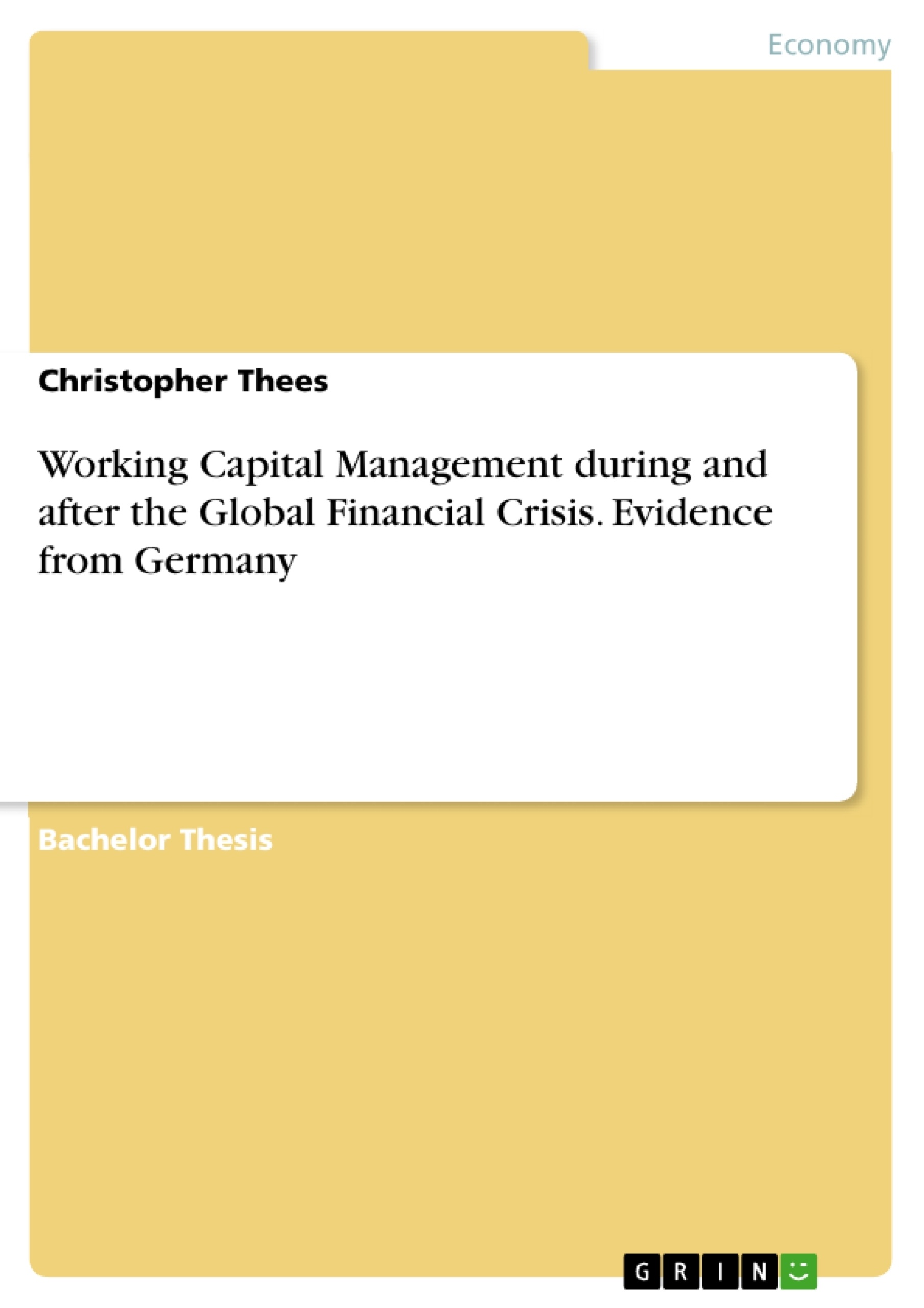The present thesis tries to figure out, if the Working Capital Management of German companies is reactive to changing interest rates for their refunding or if it is really a pro-active improvement since the beginning of the 2000s as claimed by the literature. After a theoretical definition of Working Capital, its functions, goals and its relationship to the management process, Working Capital will be set into a context of company crises to lead to the central object of investigation, the Global Financial Crisis. With a quantitative analysis via DataStream of the companies currently listed in the DAX, MDAX and SDAX (N=130) it will be examined, if the credit crunch for companies in the Global Financial Crisis and the easy refunding possibilities afterwards due to the easy money policy of the European Central Bank had effects on the quality of the Working Capital Management. The analysis of the data via SPSS will show, that the possibilities of refunding indeed influence this quality, whereby the intensity of the reactionary behaviour of the companies depends mainly on the object of cognition, which is in this thesis examined by the parameters size, age and industry sectors, so that the results could serve as a basis for further management research.
Inhaltsverzeichnis (Table of Contents)
- 1 Introduction
- 2 Literature Review
- 2.1 Object of Working Capital Management
- 2.1.1 Working Capital
- 2.1.2 Management
- 2.1.3 Working Capital Management
- 2.2 Company Crises
- 2.2.1 Crisis Process
- 2.2.2 Crises Causes
- 2.2.3 Early Detection and Intervention
- 2.3 Working Capital Management during Crisis
- 2.3.1 Working Capital Management as a Cause, Indicator and Counteragent
- 2.3.2 Working Capital Management during the Global Financial Crisis
- 2.3.3 Working Capital Management after the Global Financial Crisis
- 2.1 Object of Working Capital Management
- 3 Methodology
- 4 Results of Empirical Research
- 4.1 Overall Results
- 4.2 Special Observations regarding the Object of Cognition
- 4.2.1 Industry Sectors and the Relationship to Working Capital Management
- 4.2.2 Company's Size and the Relationship to Working Capital Management
- 4.2.3 Company's Age and the Relationship to Working Capital Management
- 5 Discussion
Zielsetzung und Themenschwerpunkte (Objectives and Key Themes)
This bachelor thesis aims to analyze the impact of the global financial crisis on working capital management in German companies. The research focuses on investigating how working capital management practices were affected during and after the crisis, examining the role of working capital in the crisis process, and exploring potential changes in working capital management strategies as a result of the crisis.
- The impact of the global financial crisis on working capital management in German companies.
- The role of working capital management in crisis prevention, mitigation, and recovery.
- Changes in working capital management practices during and after the crisis.
- The relationship between industry sectors, company size, and company age, and their impact on working capital management.
- The effectiveness of different working capital management strategies in mitigating the effects of the crisis.
Zusammenfassung der Kapitel (Chapter Summaries)
The first chapter provides an introduction to the topic, outlining the research question, the scope of the study, and the structure of the thesis. Chapter two presents a comprehensive literature review on working capital management, company crises, and working capital management during crises, focusing on the global financial crisis and its impact on German companies. Chapter three outlines the methodology used in the research, including data collection and analysis techniques. Chapter four presents the results of the empirical research, focusing on overall results, as well as specific observations regarding industry sectors, company size, and company age. Chapter five discusses the findings and their implications, drawing connections between the empirical findings and the theoretical framework presented in the literature review.
Schlüsselwörter (Keywords)
The primary focus of this research is on working capital management in the context of the global financial crisis, specifically analyzing the impact on German companies. Key terms and concepts include: working capital, working capital management, company crises, financial crisis, industry sectors, company size, company age, empirical research, and data analysis.
Frequently Asked Questions
How did the financial crisis affect Working Capital Management (WCM)?
The crisis led to a credit crunch, forcing companies to optimize their internal liquidity through better management of inventories, receivables, and payables.
Is WCM in German companies proactive or reactive?
The research examines whether companies actively improved WCM since the early 2000s or simply reacted to changing interest rates and refunding possibilities.
What role does company size play in WCM?
The study finds that the intensity of reactionary behavior to financial shifts depends significantly on parameters like the size, age, and industry sector of the company.
Why is WCM important during a crisis?
Effective WCM serves as an early detection tool and a counteragent to insolvency by ensuring the company maintains sufficient cash flow when external credit is scarce.
What are the key components of Working Capital?
It primarily involves managing current assets (inventories, trade receivables) and current liabilities (trade payables) to ensure operational liquidity.
- Quote paper
- Christopher Thees (Author), 2015, Working Capital Management during and after the Global Financial Crisis. Evidence from Germany, Munich, GRIN Verlag, https://www.grin.com/document/310122



